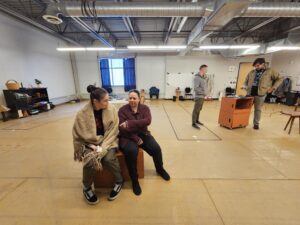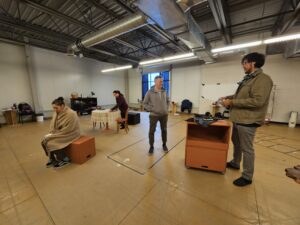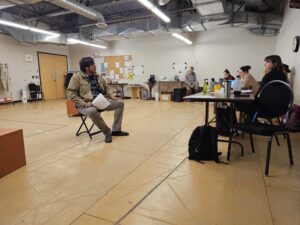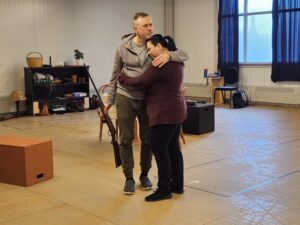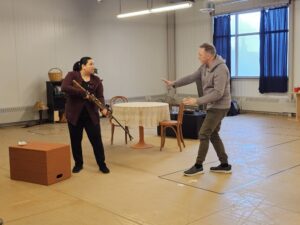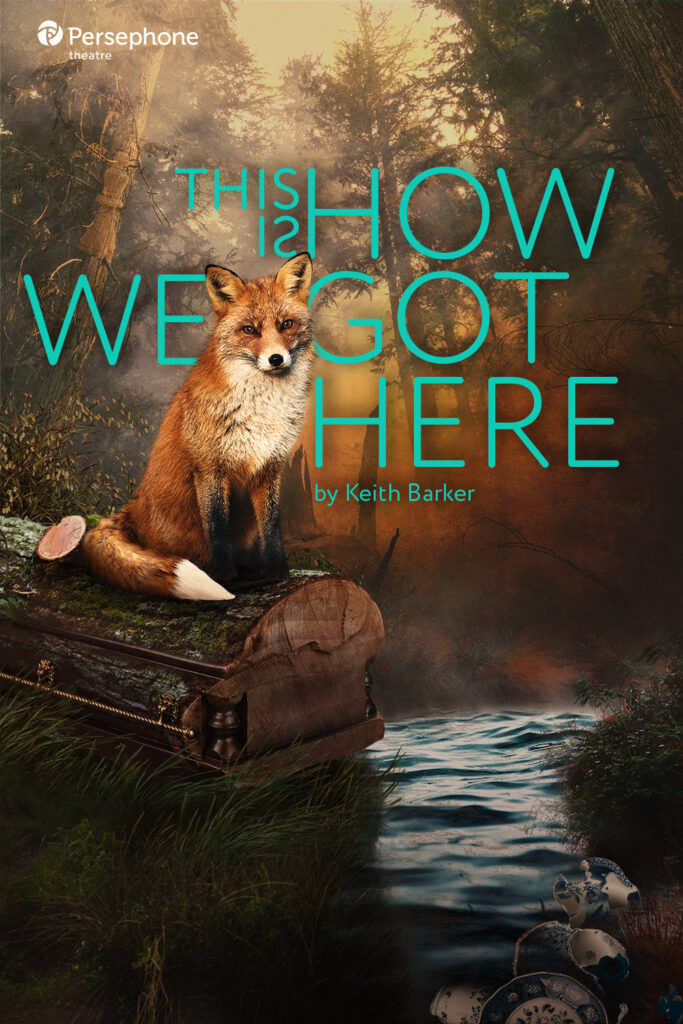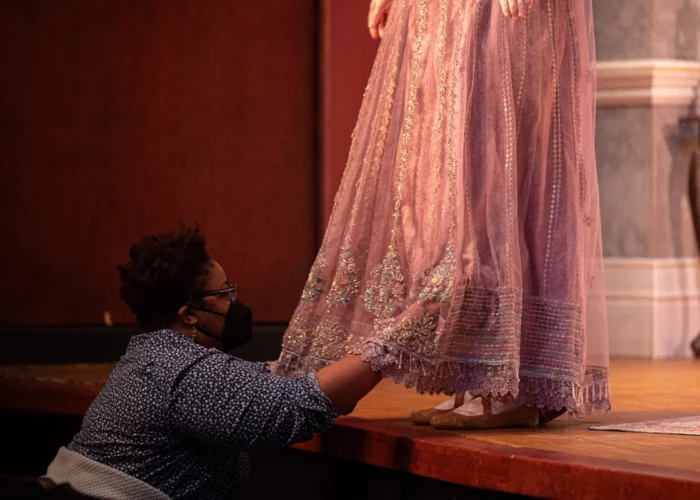This Is How We Got Here Focuses on Importance of Community and Mental Health
By Jodi Schellenberg
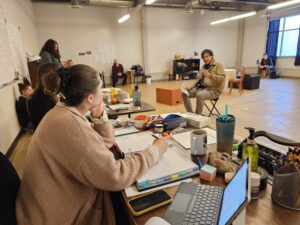
Although we are experiencing frigid temperatures, people can still enjoy the warmth of togetherness and community when facing the cold adversities of life while watching a Persephone Theatre production this February.
This Is How We Got Here by Keith Barker will be playing on the Persephone Theatre Main Stage Jan. 31 to Feb. 11. The play is a traditional family drama about two couples learning to rebuild their community with connection, forgiveness, humour and love after a loss to a battle with mental health. The ties that keep them together as sisters, best friends, and spouses are strained — until a visit from a fox changes everything. It is a stunning and hopeful look at how we help one another through life’s challenges.
Director Katie German said the play is full of hope, connectedness and humour, which comes from themes of relationships and healing in the story.
“I think it’s the reconnection to community because … (the family in the play) loses track of that,” German explained. “It’s the rebuilding and refiguring about what this means for their community and how does that mean they become a community again? And how are they different now because of this and embracing it.”
“I believe community care is something that really can get people through anything,” Assistant Director Rayna Masterton said. “In the writing, it still came through that like, ‘Oh, right. Even though they’re struggling to connect, the community care is there in the end.’ And (the family does) get through it because of each other.”
The topic of mental health is important, especially in the coldest winter months. The most difficult months for people with Seasonal Affective Disorder (SAD) in the North America are January and February, which makes the themes of the play around mental health and supporting your community timely.
Although many might think the topic is heavy and deals with the topic of mental health and suicide, both German and Masterton said the way Barker has written the story will impact people in a positive way.
“I think anyone, around the world, has dealt with suicide – whether they’ve been directly affected by it or loosely connected to it – and I think those questions that people have are universal. Masterton said. “I was really drawn to the way that Keith (Barker) deals with those questions being unanswered, acknowledging them, and still finding humor in moments of grief and sadness or hurt and anger, without sinking into it and (focusing on) how we do change because of it.”
German said the funny thing about grief is we feel like it is supposed to be sad and crying, but there are so many other ways we feel it—from laughter at happy
memories and the connections we build with each other.
“Keith (Barker) has a brilliant way of building it and building space for you to not be in that heaviness,” she explained. “And there’s a beautiful story of a fox that carries through.”
“The more you evade your grief or just being in tune with your emotions, the worse it’s going to be,” Masterton said. “If you can show up with an open heart and just be accepting of any feeling or emotion that comes, you’re just going to be better for it at the end. Whether that’s because your cheeks hurt and you were laughing a lot or you’ve used all the tissues in your pocket that you could possibly find, you just know you’re going to leave feeling well taken care of.”
Community care on and off the stage
Community care has become a large part of the theme during the production, both on stage and off. In the rehearsal hall, the community care continues with the entire creative team of the play. Every day, they make sure to check in with one another, making sure everyone is comfortable and has what they need to make each day as positive as possible.
“The community that we’ve built is pretty awesome,” German said. “There’s people who have worked at Persephone (before), so it’s nice to see the way that they’re taking care of each other too and sharing their experiences and sharing the things that might work for them or might not.”
Another way the team is building community care is through the mentorships they have experienced with the This Is How We Got Here team.
Barker was one of the first people to give German a professional opportunity when she didn’t know she was prepared for it. She was surprised by what he saw in her, which then helped German to grow as an artist.
“The ability Keith (Barker) has to see what people can do before they actually do it, I think that’s so important in in mentorship,” German said. “Taking someone, putting them in a space that they haven’t been before, but supporting them by allowing them to not be alone in that space and continue the training (is important) … it’s putting them in a position that they maybe haven’t had a chance to do yet, and allowing them to thrive and allowing them to fail, but in a kind wonderful way.”
Since Barker gave her the opportunity to learn through mentorship, German is now doing the same thing for Masterton.
“I’m really grateful that I then have been able to come onto this project and fail and ask questions,” Masterton said. “All the things Katie talks about (mentorship) are things she’s doing in the room.”
“It’s a nice symbiotic creation,” German added. “We’re working on this together and we’re creating this together. I feel like that is kind of what community is too – it’s not just one person doing all the things and everyone else kind of sitting on the sidelines waiting for it to happen. It’s everyone chips in together and works together and I’m just grateful for that.”
Both hope the audience will also feel the community atmosphere when they come to the theatre, from the feelings they have throughout the experience of the play, to the fact all the cast are live in Saskatoon.
“There is a feeling of community care just based on putting the show on, but also with people coming in and sharing in that grief and sharing in the laughter and hope and questions that are left unanswered,” Masterton said. “I hope they feel seen and more connected because that’s what we do with theater is showing people these things happen, and how we all go through them in different ways.”
German said she heard when an audience is sitting together watching a play, their breath and heartbeats sync up, which she thinks is a beautiful way people come together as a community.
“Bring your community,” German said. “You can experience it with someone else because that’s what this is about. It’s about people, together, it’s not about people, separate.”
Photo credits: Rehearsal is underway at Persephone Theatre for This Is How We Got Here by Keith Barker. Featuring: Danny Knight, Kathleen MacLean, Skye Brandon and Jennifer Dawn Bishop.
